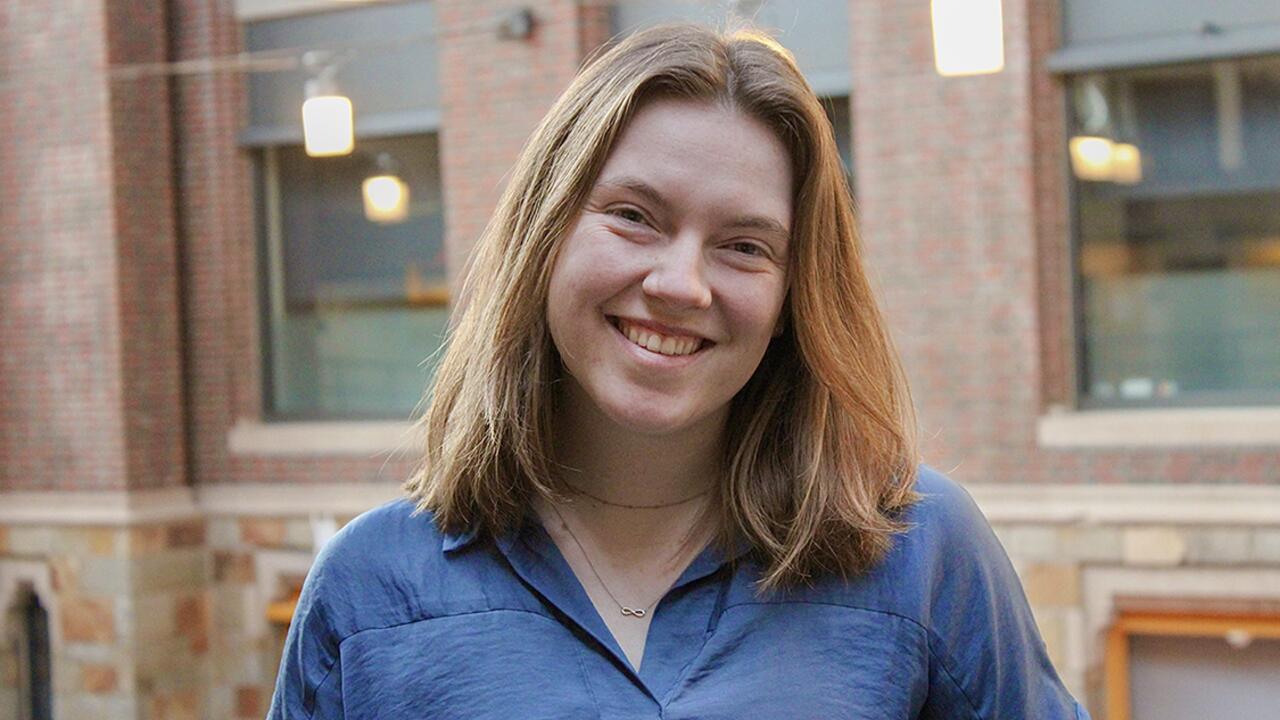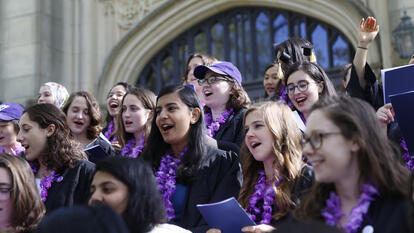
Senior Snapshot, Alex Edwards ’23: “I Can See the Ties Between Every Single Class I’ve Taken”
Everything ties together for Alex Edwards ’23. A neuroscience major, Edwards says she has benefited from the interdisciplinary nature of Wellesley’s academic program, which led her to areas she never would have explored otherwise. She says she “messed around with classes” during her first semester and “took advantage of shadow grading” by enrolling in courses in archaeology and sociology (which eventually became her minor).
“Just being able to explore so widely has been so fascinating, so empowering, and so valuable in facilitating an interdisciplinary education,” says Edwards. She loves how her courses have built on one another: “I can see the ties between every single class I’ve taken.”
Edwards, who is from the Bay Area, took a class at UC Berkeley in high school that sparked her interest in neuroscience. Before she applied to Wellesley, she reached out to Barbara Beltz, Allene Lummis Russell Professor of Neuroscience. After an initial video call, Edwards met with Beltz over lunch during her first visit to campus. That kind of professor-student interaction is what really drew Edwards to the College. She remarks that she was impressed by how much professors at Wellesley “genuinely cared about students and their success and how much they wanted to help them achieve whatever their goals were.” Now, Beltz is Edwards’ thesis advisor, research advisor, and major advisor, and Edwards has worked in Beltz’s lab for three years.
“It’s incredibly valuable that I’ve been able to have my first real lab experiences in spaces that are dominated by women and are so much more gender inclusive.”
Alex Edwards ’23
Edwards is also grateful for the opportunities that “can kind of spring up out of nowhere.” She landed an internship in a neuroscience research lab at the National Institutes of Health studying fruit flies, in part because she’d already studied fruit flies as part of her regular neuroscience coursework. Her résumé’s uncommon pairing of classwork and research stood out, thanks to Wellesley’s distribution requirements.
Edwards also especially values the gender dynamics of working in a lab at Wellesley. To compete in her high school multivariable calculus class, in which only four out of 30 students were female, she felt she had to prove she “had the brains,” but at Wellesley, Edwards says, she has “never felt that” and it’s “the best feeling in the world.” “It’s incredibly valuable that I’ve been able to have my first real lab experiences in spaces that are dominated by women and are so much more gender inclusive,” she says.
Edwards has learned to not let fear of rejection hold her back from building relationships with her fellow students and professors. In her free time, she likes to challenge herself by climbing with the Babson Olin Wellesley climbing organization and playing sudoku. Though, for Edwards, professor-student relationships have defined her Wellesley experience. She appreciates that her professors have taken the time to get to know her and care about helping her balance her health, life, and academics while still pushing her to meet her goals.
In that vein, Beltz added Edwards’ name to one of her lab’s publications based on data Edwards gathered for her thesis project on neuron growth in adult crayfish. Edwards’ thesis will be the final paper published out of Beltz’s lab; Beltz will retire at the end of the semester. After graduation, Edwards plans to move to Chicago to work as a research assistant in a lab at Northwestern University, researching the link between the immune system and Alzheimer’s disease.
Edwards is grateful for the freedom she has had to mix and match classes at Wellesley, which she says has expanded her understanding of every subject she has explored, from anthropology to religion to neuroendocrinology. She offers this advice to incoming Wellesley students: “Take classes way outside of your interests, because you are going to love them. The professors here are so good. There’s no way you’re not going to at least learn one super, super cool thing that’s going to stick with you.”



